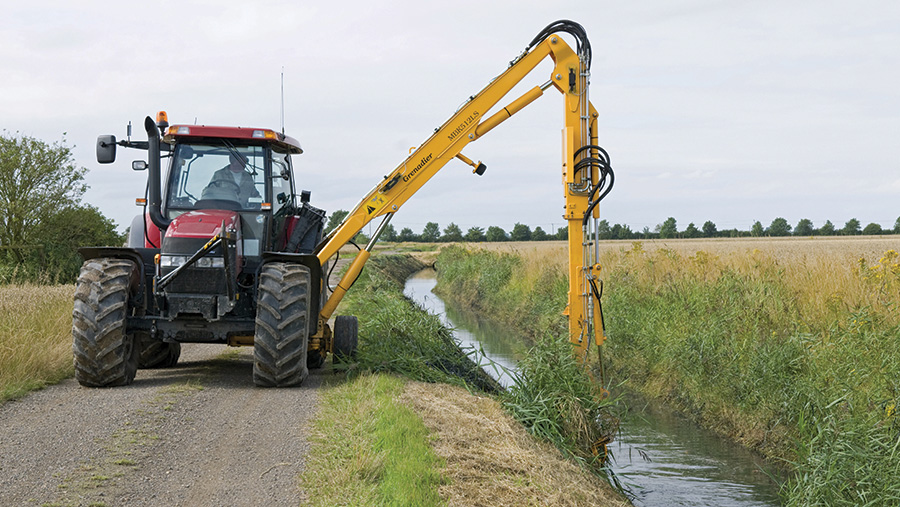Farmers and conservationists split over river dredging plans
 © David Burton/FLPA/Imagebroker/Rex/Shutterstock
© David Burton/FLPA/Imagebroker/Rex/Shutterstock Industry leaders and conservationists are split over Defra plans to allow farmers to clear man-made watercourses as part of the government’s flood defence plan.
Farm leaders insist the plan is vital if farmers are to mitigate flood risk on their own land. But conservationists and some environmental experts believe allowing farmers to dredge watercourses could increase the risk of flooding further downstream.
See also: Farm floods: Guide to practical and financial support
Proposals allowing farmers to clear smaller watercourses and ditches were unveiled by Defra secretary Liz Truss at the Oxford Farming Conference on Tuesday 6 January. Subject to parliamentary approval, the policy could come into effect as soon as April.
The decision follows a series of pilot projects which were started two years ago (see below).
Power
Ms Truss said: “We will also soon announce proposals to give internal drainage boards and other groups more power to maintain local watercourses.”
The proposals would allow farmers to clear debris such as silt without having to first seek permission to do so – so long as certain conditions are adhered to.
Farmers will be allowed to clear a maximum of 1.5km per man-made ditch, land drain or agricultural channel.
Regulations to integrate the flood defence consent scheme into the Environmental Permitting regime will be laid in draft, and then debated before coming into force this spring. The new scheme will be reviewed after three years in 2019.
NFU president Meurig Raymond, who is among those who have lobbied Defra to grant farmers permission to undertake minor works on watercourses, said he looked forward to seeing more detail on the proposals.
“Quick reactions and flexible decision-making must be part of these permissions,” he said.
“We must see more attention given to other policies such as an increase in funding for flood maintenance activities, sustainable drainage and see a higher value placed on farmland.”
Protect
Defra says its investment in flood defences could protect an additional 400,000ha of prime agricultural land from flooding over the decade to 2021.
But some ecologists believe that farmers who clear watercourses could contribute to a higher flood risk further downstream.
Professor Alan Jenkins, of the Centre for Ecology and Hydrology, said: “Waterlogged fields are no use to farmers – they can’t maintain their productivity on waterlogged soil, so it makes sense for them to manage the field accordingly.
“There is a potential downside, however, in that if we increase drainage in these fields during heavy rainfall, it’s possible there will be increased and faster transmission of water through the river system with a possible increase in flood risk downstream.”
A similar view was expressed by the Angling Trust. Stopping rivers flooding fields upstream would only increase the discharge of water downstream, where it would flood homes and businesses, it warned.
Dredging to protect farmland was responsible for decimating wildlife in many rivers in the 1960s and 1970s, said Angling Trust chief executive Mark Lloyd. The government’s plan would have a similar result, he claimed.
“It is unbelievable that the secretary of state for the environment is seeking to go back to those bad old days,” said Mr Lloyd. “Unregulated dredging could do great damage to these ecosystems and the economic benefits to rural communities arising from angling.”
Pilot projects were a success, says Truss
Defra’s decision to allow farmers to clear watercourses follows a series of river maintenance pilot projects conducted by the Environment Agency (EA).
Nine pilot projects were introduced in different parts of England during October 2013 to give landowners, community and environmental groups an opportunity to be involved in dredging decisions – and to carry out their own watercourse maintenance.
In her speech to the Oxford Farming Conference, Defra secretary Liz Truss described the pilot projects as “successful”.
But the Angling Trust argues that the pilots failed to make the case for further deregulation of dredging.
The pilots focused on three issues: river maintenance, which had been reduced or stopped in many areas; rules which farmers said prevented them from carrying out work themselves; and a lack of discussion with local communities regarding EA maintenance plans.
Findings suggest that “farmers and landowners can carry out dredging to remove silt in an environmentally sensitive way”, according to an EA report.
But the document also acknowledges sometimes dredging can make flooding worse downstream.
The report says the agency cannot afford the same amount of watercourse maintenance work as in the past.
But it says the pilots were supported by “clear guidance” to ensure that farmers knew how to carry out maintenance in an effective way that did not harm the environment.
